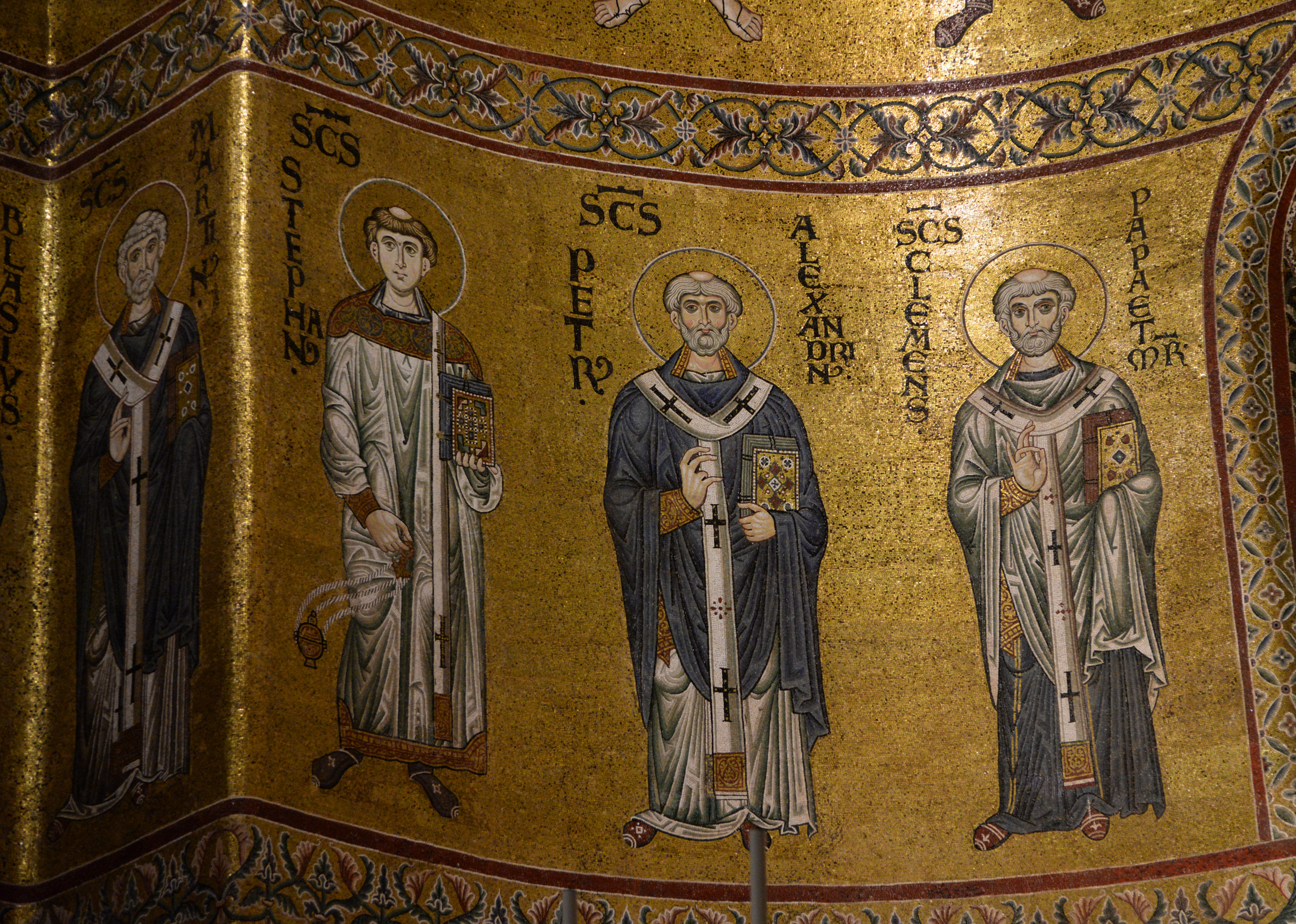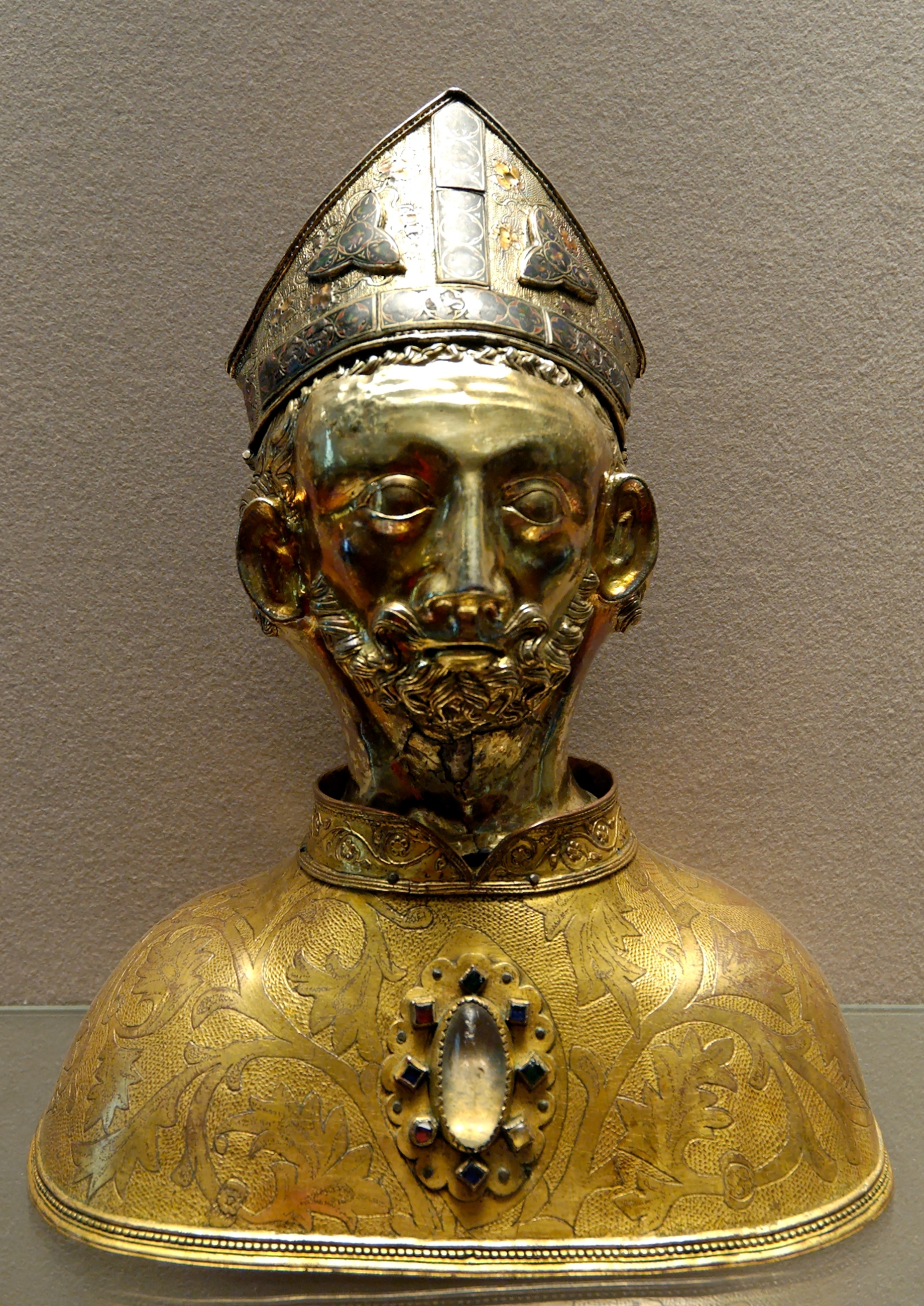Today is the feast of St Martin of Tours, the first non-martyr to have a recognised cult, and a very popular saint in the middle ages - as is indicated by the wide distribution of the images below.
On the Medieval Religion discussion group Gordon Plumb posted the following stained-glass depictions of St Martin:
Beverley Minster, east window, panels of c.1235:
1e, Martin dividing cloak with beggar:
https://www.flickr.com/photos/22274117@N08/3370751437
2a: St Martin among robbers:
https://www.flickr.com/photos/22274117@N08/3370748595
2h: Dream of St Martin:
3h: St Martin chosen as bishop:
https://www.flickr.com/photos/22274117@N08/3370766983
https://www.flickr.com/photos/22274117@N08/3371577724
3b: Miraculous mass of St Martin:
https://www.flickr.com/photos/22274117@N08/3371584594
4h: Death of St Martin:
https://www.flickr.com/photos/22274117@N08/3371590234
Tours Cathedral, bay4, St Martin window, c.1300:
https://www.flickr.com/photos/22274117@N08/14915306224
and detail:
register 4, Martin and the miracle of the pine; Martin baptizes:
https://www.flickr.com/photos/22274117@N08/15536918582
Exeter Cathedral, Choir Clerestory, east window, c.1301-1304:
https://www.flickr.com/photos/22274117@N08/2886163886
York St Martin cum Gregory, sII, 2b-3b, Martin dividing cloak with beggar, c.1340.:
https://www.flickr.com/photos/22274117@N08/4093266976
and detail:
https://www.flickr.com/photos/22274117@N08/4093261040
York St Martin--le-Grand, Coney Street, nII, Life of St Martin, a set on images of the window, c.1440:
https://www.flickr.com/photos/22274117@N08/albums/72157603903400734
Dewsbury Minster, north transept window, 2c, arms of St Martin:
https://www.flickr.com/photos/22274117@N08/4009638434
Shrewsbury, St Mary, south aisle, south-west window, glass from Musterbilzen in Belgium:
https://www.flickr.com/photos/22274117@N08/3180236634
St Nicholas-de-Port, bay 20, St Martin and the beggar, 1514-20 by the workshop of Valentin Bousch:
https://www.flickr.com/photos/22274117@N08/15603129316
John Dillon supplemted Gordon Plumb's posting by adding additional period-pertinent images of St. Martin of Tours:
a) as depicted (at far left) in the heavily restored later sixth-century mosaics (c. 560) in the nave of Ravenna's basilica di Sant' Apollinare Nuovo:

b) as portrayed on one of the very late eleventh-century capitals in the cloister (consecrated, 1100) of the abbaye de Saint-Pierre at Moissac:
http://p2.storage.canalblog.com/28/53/610887/78802475_o.jpg
c) as depicted (at centre in lower register, between Sts. Lawrence of Rome and Leonard of Noblac) in a twelfth-century icon of Byzantine origin or inspiration in the Holy Monastery of the God-trodden Mount Sinai in St. Catherine (South Sinai governorate):
d) as depicted in a somewhat restored seemingly earlier twelfth-century mosaic in the diaconicon of the basilica (ex-cattedrale) di Santa Maria Assunta on Torcello:
http://tinyurl.com/26vvdrv
http://tinyurl.com/25a2z44
e) as depicted in an earlier twelfth-century legendary from the abbey of Cîteaux (between 1101 and 1133; Dijon, Bibliothèque municipale, ms. 641, fol. 113r):
f) as depicted (at far left) in the late twelfth-century mosaics (c. 1182) in the sanctuary of the basilica cattedrale di Santa Maria Nuova in Monreale:

g) as portrayed in high relief in two locations on the right portal of the late twelfth or earlier thirteenth-century south porch of the basilique cathédrale Notre-Dame in Chartres:
1) On the right jambs (at left; at right, St. Jerome):
http://tinyurl.com/ostx422
Detail view:
http://tinyurl.com/ou6mnb5
Detail view:
http://tinyurl.com/nqfmnwc
h) as portrayed (scenes from his Vita) in four earlier thirteenth-century reliefs on the facade of the cattedrale di San Martino in Lucca:
http://tinyurl.com/27df48s
http://tinyurl.com/26rpoeb
http://tinyurl.com/2agms7o
http://tinyurl.com/29zfghw
There are detail views on this page:
http://tinyurl.com/32c6gkz
i) as depicted in the early thirteenth-century Life of St. Martin window (bay 7; c. 1215) in the cathédrale Saint-Étienne in Bourges:
http://www.medievalart.org.uk/bourges/07_pages/Bourges_Bay_07_key.htm
Detail view (cutting his cloak):
http://www.medievalart.org.uk/bourges/07_pages/Bourges_Bay_07_panel_01.htm
j) as depicted in the earlier thirteenth-century Life of St. Martin window (bay 102; c.1215-1225; restored, 1922 and 1995-1996) in the basilique cathédrale Notre-Dame in Chartres:
http://tinyurl.com/na6elhu
Detail view (cutting his cloak):

k) as depicted (cutting his cloak) in an earlier thirteenth-century copy (c.1236-1250) of part of the Magnum legendarium Austriacum (Zwettl, Stiftsbibliothek, cod. 14, fol. 149r):
http://tarvos.imareal.oeaw.ac.at/server/images/7002565.JPG
l) as depicted in the earlier thirteenth-century Life of St. Martin window (bay 102b; c. 1240) in the cathédrale Saint-Maurice in Angers:
http://www.medievalart.org.uk/Angers/Bay_102b/Angers_Bay102b_Key.htm
m) as depicted (enthroned) in a mid-thirteenth-century pontifical from Mainz (between 1241 and 1251; Paris, BnF, Ms. Latin 946, fol. Av):
n) as depicted (cutting his cloak) in a late thirteenth-century copy of French origin of the Legenda aurea (San Marino, CA, Huntington Library, ms. HM 3027, fol. 156r):
http://digitalassets.lib.berkeley.edu/ds/huntington/images//000913A.jpg
o) as depicted (cutting his cloak) in the late thirteenth-century Livre d'images de Madame Marie (c. 1285-1290; Paris, BnF, ms. Nouvelle acquisition française 16251, fol. 89r):
p) as depicted (cutting his cloak) in an early fourteenth-century fresco in the cathédrale Saint-Gatien in Tours:
https://www.flickr.com/photos/biron-philippe/7585653434/
q) as depicted (scenes from his Vita) by Simone Martini in a series of early fourteenth-century frescoes (between 1312 and c. 1318) in the cappella di San Martino in the lower church of the basilica di San Francesco in Assisi:
http://www.wga.hu/art/s/simone/3assisi/00view2.jpg
Detail views with captions:
http://www.wga.hu/frames-e.html?/html/s/simone/3assisi/index.html
r) as depicted (at top right in the major panels) by Giovanni di Bonino, perhaps working from a design by Simone Martini, in one of the three earlier fourteenth-century windows (after 1312) in the cappella di San Martino in the lower church of the basilica di San Francesco in Assisi:
http://www.wga.hu/art/s/simone/3assisi/scenes/99window.jpg
Detail view:
s) as portrayed in an earlier fourteenth-century elephant ivory statuette of German origin (c. 1320; Köln or Mainz) in the Victoria and Albert Museum, London:
http://tinyurl.com/nsnqkgh
t) as depicted (cutting his cloak) in an earlier fourteenth-century French-language legendary of Parisian origin with illuminations attributed to the Fauvel Master (c. 1327; Paris, BnF, ms. Français 183, fol. 165v):
http://tinyurl.com/nnuec2h
u) as depicted (at left; at right, St. Theodore the Stoudite) in the earlier fourteenth-century frescoes (between 1335 and 1350) in the narthex of the church of the Holy Ascension at the Visoki Dečani monastery near Peć in, depending on one's view of the matter, either the Republic of Kosovo or Serbia's province of Kosovo and Metohija:
v) as portrayed in high relief (consecration as bishop; cutting his cloak) on a mid-fourteenth-century polychromed ivory diptych (c. 1340-1350) of northern French or Flemish origin in the Cleveland Museum of Art:
w) as depicted (at lower right; cutting his cloak) in the mid-fourteenth-century San Martino altarpiece (seemingly later 1340s) from Oristano in the Antiquarium Arborense - Museo archeologico Giuseppe Pau, Oristano:
x) as depicted (cutting his cloak) in a mid-fourteenth-century copy, from the workshop of Richard and Jeanne de Montbaston, of the Legenda aurea in its French-language version by Jean de Vignay (1348; Paris, BnF, ms. Français 241, fol. 300r):
http://tinyurl.com/pua5rvp
y) as depicted (cutting his cloak) in a mid-fourteenth-century vault painting (c. 1350) in Skibby Kirke at Skibby, Lejre Kommune, Sjælland:

z) as portrayed in a late fourteenth-century reliquary bust (from Avignon?; restored in the twentieth century) in the Musée du Louvre in Paris:

aa) as depicted (at top in the right margin; demanding a steep price of Clovis for the return of a horse) in the numerous pen-and-ink illustrations in the margins of an early fifteenth-century copy of the Chronicon a mundi creatione ad annum 1220, an abbreviation and continuation of the Pantheon of Godfrey of Viterbo (c. 1400-1415; Paris, BnF, ms. Latin 4935, fol. 8v):
http://gallica.bnf.fr/ark:/12148/btv1b8455934w/f26.image
bb) as depicted (at left; at right, brigands) in an earlier fifteenth-century embroidery of southern Netherlandic origin (c. 1430) in The Cloisters Collection of the Metropolitan Museum of Art, New York:
cc) as depicted in grisaille (cutting his cloak) by Jean le Tavernier in the mid-fifteenth-century Hours of Philip of Burgundy (c. 1451-1460; Den Haag, KB, ms. 76 F 2, fol. 264v):
http://manuscripts.kb.nl/zoom/BYVANCKB%3Amimi_76f2%3A264v_min
dd) as depicted (upper right; cutting his cloak) by Girolamo di Giovanni of Camerino in a later fifteenth-century triptych (c. 1473) in the chiesa di San Martino Vescovo in Monte San Martino (MC) in the Marche:
http://tinyurl.com/q74m33o
Detail view:
ee) as depicted (cutting his cloak) in a later fifteenth-century vault painting (c. 1474) in Jetsmark Kirke at Pandrup, Jammerbugt Kommune, Nordjylland:
http://tinyurl.com/pu5sh97
ff) as depicted (cutting his cloak and other scenes from his Vita) by the Master of the Galletti Chapel in a later fifteenth-century painted altarpiece (c. 1475-1480) in the crypt of the basilica cattedrale di San Martino in Belluno:
https://c1.staticflickr.com/3/2397/2177982293_8c1e640b3d_b.jpg
gg) as portrayed (with the beggar) in a later fifteenth-century statue (c. 1475-1480) of German origin in the Seattle Art Museum, Seattle (WA):
hh) as depicted in two late fifteenth-century panel paintings (c. 1490) on either side of a wing from a dismembered altarpiece in the Magyar Nemzeti Galéria, Budapest:
1) Cutting his cloak:
ii) as depicted (center panel; cutting his cloak) by Bartolomeo Vivarini in his late fifteenth-century Triptych of St. Martin (1491) in the Accademia Carrara, Bergamo:
jj) as portrayed (cutting his cloak) in high relief in a late fifteenth- or early sixteenth-century sculpture (c. 1500), from Bjæverskov Kirke in Sjælland, in the Nationalmuseet, Copenhagen:

kk) as depicted (cutting his cloak) in an embroidered early sixteenth-century cope shield (between 1500 and 1509) in the Museum Catharijneconvent in Utrecht:



No comments:
Post a Comment